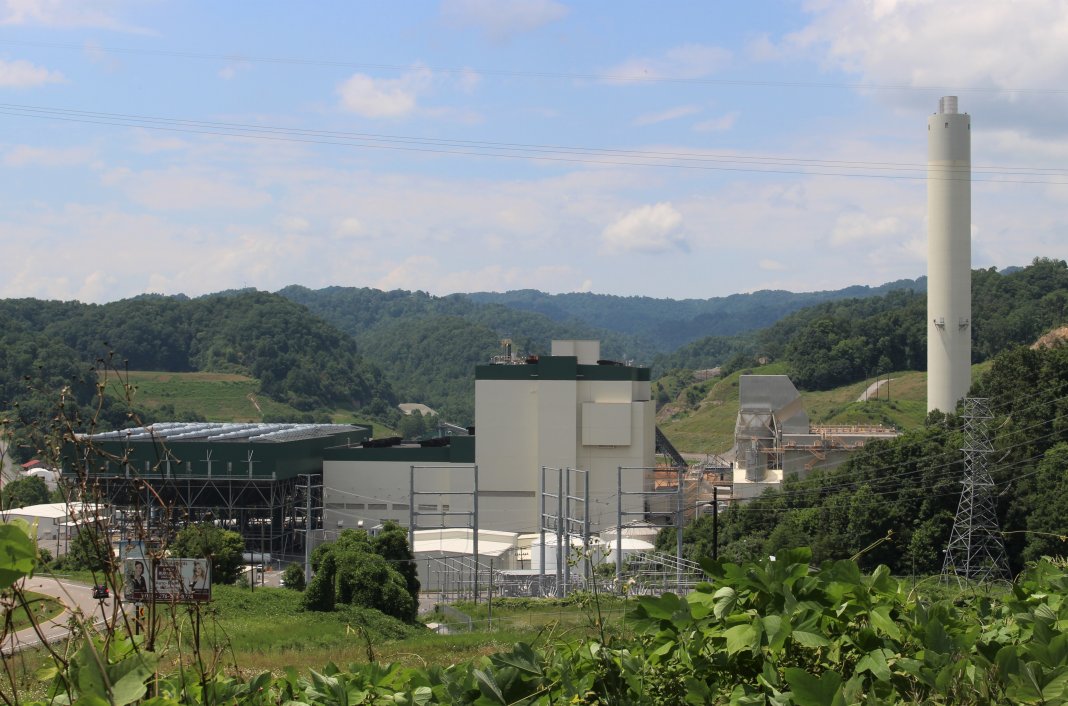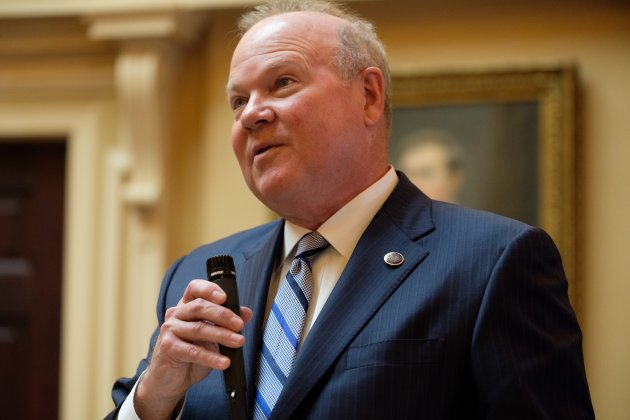Senate Removes Southwest Virginia

By Sarah Vogelsong
March 1, 2020 - An amendment to remove a 2030 closure deadline for the coal- and biomass-fired Virginia City Hybrid Energy Center from the Democrats’ Clean Economy Act omnibus bill unexpectedly cleared the Senate Thursday.
The vote in favor of the amendment, which was taken by voice, adds yet another item to the list of issues that must be resolved before the legislation can reach Gov. Ralph Northam’s desk.

Dominion Energy's Virginia City Hybrid Energy Center in Wise County, Va., 2019.
Photo: Sarah Vogelsong, Virginia Mercury
“There are still a lot of moving parts happening to this bill,” said House sponsor Del. Rip Sullivan, D-Fairfax, shortly after the vote. “Time is running out.”
While the Clean Economy Act has passed both chambers, important differences between the more aggressive House and more conservative Senate versions of the bill are set to push the legislation into a conference committee, a smaller group of lawmakers who will be tasked with hashing out the disputes.
Among those disagreements are timelines for Virginia to achieve zero-carbon emissions — the House wants 2045 while the Senate wants 2050 — and binding energy efficiency targets, which in the House are double their Senate counterparts.
Negotiations are ongoing between the many parties involved in crafting the VCEA, a group that includes Dominion Energy and Appalachian Power, environmental organizations and the renewables industry.
But with the end of the session rapidly approaching, people privy to conversations within the coalition have said pressure is building to complete negotiations by Monday.
Asked about whether there was a hard deadline for outstanding issues to be resolved, Sullivan said only that “Monday seems like a good day” and “if we can’t get there we will have to make some decisions.”
he Virginia City Dispute
The amendment to remove the Virginia City plant in Wise County from the closure list was offered by Sen. Ben Chafin, R-Russell, who launched an impassioned defense of the plant.
Dominion’s VCHEC began operation in 2012 and is seen by many in economically struggling Southwest Virginia as a rare bastion of stability. Despite its young age — Chafin described it as “barely out of diapers” — it would have to close under the current version of the Clean Economy Act by 2030, six years later than the 2024 closure deadline for most of Virginia’s other coal facilities.

Sen. Ben Chafin, R-Russell.
Photo by Ned Oliver, Virginia Mercury
Another coal-fired plant, the Clover Power Station in Halifax that is jointly owned by Dominion Energy and Old Dominion Electric Cooperative, is also exempted from the 2024 deadline and could presumably operate until 2045 or 2050.
While the Southwestern Virginia delegation has previously framed its argument against the plant’s closure in solely economic terms, the defense mounted Thursday focused mostly on its environmental effects, with Chafin pointing to the facility’s ability to burn gob coal.
“Gob” is a term used to refer to waste left behind from coal mining. When it accumulates in piles, some containing hundreds of thousands to millions of tons of discarded coal and tailings, it becomes a significant threat to water quality.
“It leaches into our streams. It leaches into our headwaters,” Chafin told the Senate.
VCHEC, he concluded, is “cleaning up Southwest Virginia for the betterment of Southwest Virginia and the betterment of the commonwealth of Virginia.”
Opponents of the amendment, however, contended that even if the plant were removed from the closure list, allowing it to operate until the 2045 or 2050 final deadline for all carbon-emitting plants to be shuttered, Dominion Energy will likely close it within the next decade as coal continues its downward spiral.
Between February 2019 and January 2020, Dominion calculated the facility’s capacity factor — a measurement that compares how much energy a unit actually produces to how much it’s capable of producing — to be just 22 percent, according to a utility filing with the State Corporation Commission.
“Can you explain to the body why, if it has been so effective and efficient, if it has been the godsend that you have said it was and where I was leaning, why it’s only operating at 25 percent capacity?” Sen. Joe Morrissey, D-Richmond, asked Chafin Thursday.
“I don’t know whether it’s 25 percent, 40 percent, 70 percent or 80 percent, but I will say they’re fully staffed,” Chafin replied. “I know of no slowdown whatsoever in the process that’s going on over there.”
After the vote, Harry Godfrey, executive director of Virginia Advanced Energy Economy and one of the Clean Economy Act’s key architects, said “the sad reality for Southwest is the economic trend lines on this plant are clear.”
“Natural gas is going to shutter the Wise plant long before a legislative deadline could,” he said.
Dominion’s Acquiescence ‘Completely Irrelevant’
Exactly who was backing Chafin’s amendment caused confusion in the chamber Thursday.
Arguing against the VCHEC change, Majority Leader Dick Saslaw of Fairfax told the Senate that the 2030 deadline “was the result of negotiations with all the concerned people, including Dominion.”
Chafin, however, questioned whether the utility actually did support the closure.
“I would ask the gentleman,” he said, holding aloft a fistful of papers, “how it is that Dominion would have provided to this senator these talking pieces, this information, and indeed participated and spent numerous hours helping prepare this amendment?”
“You’d have to ask them,” Saslaw responded. “But this is what was agreed upon by all the parties involved.”
Mike Town, executive director of the Virginia League of Conservation Voters, an active member of the coalition supporting the Clean Economy Act, told the Mercury that Dominion had put forward the 2030 deadline for closing VCHEC during negotiations.
“Dominion offered to the environmental community putting coal retirements in the legislation, including the Wise County plant in 2030 with the carbon capture, and we said yes to that,” he said. (Another provision in the current legislation would allow VCHEC to remain open after 2030 if it could demonstrate carbon reductions of 83 percent through carbon capture, a technology still in its infancy.)
A Dominion spokesperson would not comment, citing its ongoing policy of not speaking with the Virginia Mercury.
Sen. Chap Petersen, D-Fairfax City, on Thursday said it was “completely irrelevant” whether Dominion supported a particular closure date.
“This has to do with what are the costs of the commonwealth of Virginia environmentally, socially, economically,” he said. “That’s the issue, not whether or not, quote, ‘Dominion agrees to it.’”
Sen. Jennifer McClellan, D-Richmond, the sponsor of the Senate version of the bill, insisted that all differences could be worked out in conference committee.
“There is still a discussion going on. We’ve heard you,” she said. “But those discussions are going on right now, and you will have a conference report that will strike the right balance between which coal plants, what order should they be closed.”

